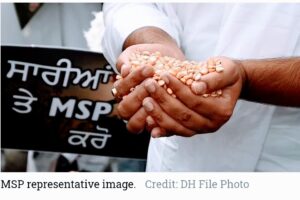Yet, political parties give because it helps them win elections.

MSP representative image. Credit: DH File Photo
In the recently concluded state assembly elections, among the various guarantees made by the BJP—Modi’s guarantees—a significant commitment is a hefty increase in the minimum support price (MSP) for paddy and wheat offered to farmers in Madhya Pradesh and Chhattisgarh.
In MP, the party promised an MSP of Rs 3,100 per quintal for paddy, a 42% increase from the current Rs 2,183 per quintal fixed by the Centre. For wheat, the promised MSP is Rs 2,700 per quintal, a 27% rise from the existing Rs 2,125 per quintal. In Chhattisgarh, a commitment was made to procure paddy at an MSP of Rs 3,100 per quintal, up to a maximum of 21 quintals per acre.
Now that the BJP is in power, these state governments will have to spend extra money to redeem these commitments. For instance, MP will need to spend Rs 5,000 crore more on its purchase of paddy of 5.2 million tonnes and Rs 4000 crore on the procurement of wheat of around 7 million tonnes.
Is there any way for these states to recover the additional expenditure on
the procurement of paddy and wheat?
Under the National Food Security Act (NFSA) scheme run by the Government of India (GOI), agencies like the Food Corporation of India (FCI) buy agri-produce, such as wheat, rice/paddy, and coarse cereals, from farmers at the MSP and distribute at a subsidised price of Rs 1/2/3 per kg through a network of fair price shops, known as the public distribution system (PDS), to meet the needs of around 820 million beneficiaries. The excess of MSP, plus handling, storage, and distribution costs over Rs 1/2/3 per kg, is paid as a subsidy.
Moreover, under the decentralised procurement scheme (DPS), the designated states undertake direct purchases of paddy and/or wheat (on behalf of the GOI) and store and issue foodgrains as per allotments indicated by the latter under the PDS. However, reimbursement of subsidies to the designated states is made only with reference to the MSP announced by the Centre. Any extra money paid by the state over and above the MSP has to come from its own treasury. It doesn’t stop here.
With such lucrative MSP promised to state farmers, they would come in droves to sell their produce to the state agencies, to which the latter couldn’t say ‘no’. As a result, state procurement could be far in excess of the quantum that could be accommodated by the central pool, maintained by the FCI, under PDS. The state government will have only two options to deal with it: either allow it to rot or dispose of it in an auction for private trade at a throwaway price.
In 2017, the Modi government at the Centre did right by directing the then-Raman Singh government to stop giving a bonus of Rs 300 per quintal, which had been giving since January 2014. Now, it has taken a U-turn by not only promising a hefty bonus of three times that figure but also delivering on the outstanding paddy procurement bonus for those two remaining years, viz., 2017 and 2018, at Rs 300 per quintal.
Clearly, a hefty bonus over the MSP (fixed by the Centre) is bad economics as far as the state is concerned. Yet, political parties give because it helps them win elections. It is likely to stay forever, and over time, the quantum will only increase. Besides, it will have repercussions at the all-India level. In view of the impending Lok Sabha elections next year, there could be pressure on Modi to match the MSP hikes as promised by MP and Chhattisgarh.
If the BJP commits to a similar MSP hike of Rs 917 per tonne for paddy, taking procurement of 83 million tonne (quantity procured during Kharif Marketing Season 2022-23), the food subsidy expenditure could increase by over Rs 76,000 crore. Similarly, with an increase of Rs 575 per tonne in MSP of wheat and procurement of 26 million tonne—procured during Rabi Marketing Season 2023–24—the spend on subsidy will go up by about Rs 15,000 crore.
A higher MSP will tempt many more farmers to offer their produce to government agencies. This could result in procurement on a much larger scale and a corresponding increase in the subsidy bill. The agencies will also be saddled with problems of excessive stocks, high carrying costs, and waste.
Moreover, India may face difficulties defending its escalating farmer subsidies at the WTO.
In 2021, there was a vocal demand by farmers protesting against the three central farm laws for giving legal guarantees to MSP. The Modi government had rejected it, and rightly so. But, now, de facto, it is more than willing to buy unlimited quantities at an ever-increasing price as long as it can get votes.
(The writer is a policy analyst)
Published on December 25, 2023
https://www.deccanherald.com/opinion/msp-guarantee-is-bad-economics-2824185